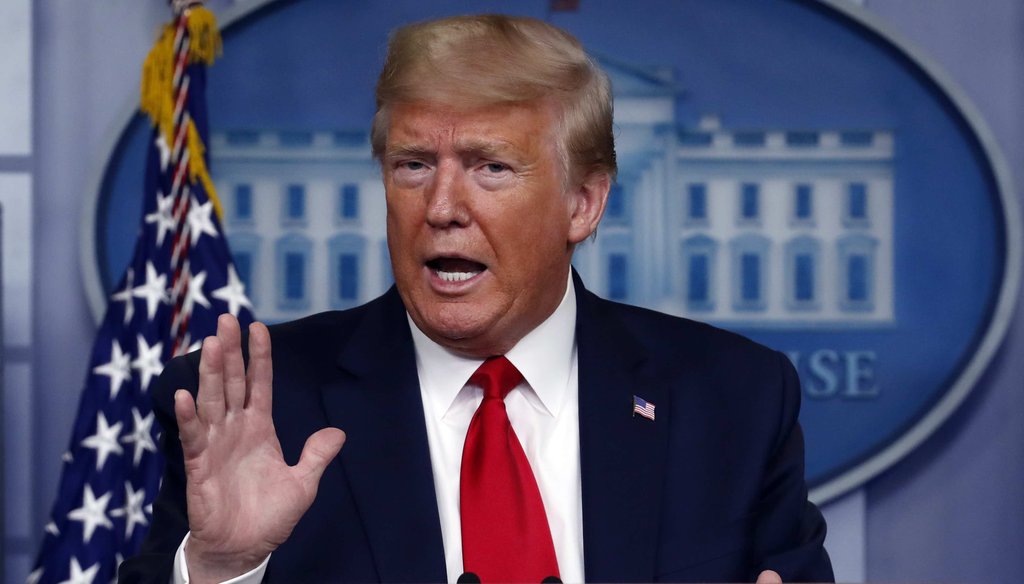

Our only agenda is to publish the truth so you can be an informed participant in democracy.
We need your help.


President Donald Trump speaks about the coronavirus in the James Brady Press Briefing Room of the White House on April 8, 2020, in Washington. (AP)
Trump has a small stake through a mutual fund in Sanofi, a French company that makes hydroxychloroquine.
The president’s holdings in Sanofi are valued at up to $1,500, meaning he would not stand to profit much from the company’s stock performance.
Experts told us that Trump’s holdings do not violate federal conflict of interest laws.
Some Facebook users think President Donald Trump’s recent interest in a lupus and arthritis drug goes beyond its potential to treat COVID-19.
"Trump himself has a financial stake in the French company that makes the brand-name version of hydroxychloroquine," reads one post published April 7.
The image, which is a screenshot of a tweet from Ian Sams, the former national press secretary for Sen. Kamala Harris, D-Calif., was shared in a group for "center left pragmatic progressives" called The 47ers. It was flagged as part of Facebook’s efforts to combat false news and misinformation on its News Feed. (Read more about our partnership with Facebook.)
In the past few weeks, Trump has touted the potential of chloroquine and the related drug hydroxychloroquine in treating COVID-19. There is some preliminary evidence that the drugs could be effective in treating the coronavirus, but more rigorous tests have not been completed. There is currently no Food and Drug Administration-approved treatment for COVID-19.
We’ve previously reported on alleged financial ties between the Trump administration and hydroxychloroquine manufacturers, so we wanted to look into this claim, too.
Trump does have a small financial stake in a French company that makes hydroxychloroquine. But the implication of the post, that Trump could stand to profit from that stake, is misleading.
The New York Times reported on April 6 that the president has a personal financial interest in Sanofi, a French company that makes hydroxychloroquine, through a mutual fund from a firm called Dodge & Cox. At 3.3%, Sanofi is the largest holding of the firm’s International Stock Fund.
But Trump’s stake in that fund is rather small.
The president’s latest financial disclosure form indicates that he holds shares in the mutual fund through three different family trusts. The value of each of those holdings is between $1,001 and $15,000, which would put Trump’s stake in Sanofi at "between about $100 and $1,500 in total," the Washington Post reported.
"That Sanofi investment would therefore constitute between 0.000003 and 0.00005 percent of Trump’s net worth," the newspaper wrote. "If you were worth $100,000, it would be like worrying about the nickel in your pocket."
RELATED: Hydroxychloroquine and coronavirus: what you need to know
Let’s pretend that Trump’s last financial disclosure form is up-to-date and that his total holdings in Sanofi are valued at $1,500 — the high end of the range.
Since March 20, the day after the president first mentioned chloroquine during a press briefing, the company’s stock value has increased by about 17.3%. That would mean the value of Trump’s shares in Sanofi has increased by nearly $260.
Given the president’s net worth, which Bloomberg estimates to be nearly $3 billion, $260 would be a comparatively small payoff for promoting the use of hydroxychloroquine to treat COVID-19. Plus, it’s uncertain whether Trump’s remarks have affected Sanofi’s stock value; the company has performed about as well as the broader stock market.
Legally, experts say Trump’s holdings in Sanofi don’t constitute a conflict of interest.
Kathleen Clark, a law professor at Washington University, said in an email that federal law prohibits executive branch officials from participating in matters in which they have a financial interest. But the law exempts diversified mutual funds like the Dodge & Cox International Stock Fund — and because he’s the president, Trump isn’t subject to the regulation anyway.
"When Congress amended the ethics laws in 1989, it exempted the president from the criminal financial conflict of interest statute. So the statute doesn’t apply to Trump at all," Clark said. "And even if this statute did apply to the president, the regulation’s exemption would seem to apply here. So Trump’s touting of this drug does not violate the criminal conflict of interest statute."
Trump has a tiny stake in Sanofi through a mutual fund, but experts told us that Trump’s holdings do not violate federal conflict of interest laws. The post leaves out important context, so we rate it Half True.
Bloomberg Billionaires Index, Donald Trump, accessed April 8, 2020
C-SPAN, "President Trump and Coronavirus Task Force Brief Reporters," March 19, 2020
Dodge & Cox, International Stock Fund, accessed April 8, 2020
Email from Kathleen Clark, law professor at Washington University, April 9, 2020
Facebook post, April 7, 2020
The New York Times, "Trump’s Aggressive Advocacy of Malaria Drug for Treating Coronavirus Divides Medical Community," April 6, 2020
PolitiFact, "Why medical experts worry about President Trump touting chloroquine," April 7, 2020
Sanofi, "Sanofi: Important Information on Plaquenil® and COVID-19," April 1, 2020
Tweet from Ian Sams, April 6, 2020
U.S. Office of Government Ethics, Executive Branch Personnel Public Financial Disclosure Report: Donald Trump, May 15, 2019
The Washington Post, "Trump’s promotion of hydroxychloroquine is almost certainly about politics, not profits," April 7, 2020
Yahoo Finance, NASDAQ Composite (^IXIC), accessed April 8, 2020
Yahoo Finance, Sanofi (SNY), accessed April 8, 2020
In a world of wild talk and fake news, help us stand up for the facts.
